Family Nursing Health Promotion: Nursing Interventions and Family Care
VerifiedAdded on 2022/12/27
|8
|2287
|97
Report
AI Summary
This report delves into the critical role of family nursing in health promotion, emphasizing the significance of nursing interventions and the inclusion of family members in care plans. The author highlights the importance of addressing clinical conditions such as diabetes, acute respiratory disease in children, and pregnancy, providing rationale for intervention choices based on the specific needs of patients and their families. The report outlines nursing interventions tailored to these situations, including patient education, family counseling, and the application of the Self-Care Deficit theory to guide care. The author also discusses situations where interventions were deemed less critical, such as psychiatric cases and post-myocardial infarction rehabilitation, offering insights into the prioritization of nursing care. The report underscores the necessity of holistic and empathic nursing practices, emphasizing the value of family involvement and promoting the well-being of both patients and their families. The report concludes with a discussion of the self-care deficit theory and its application in clinical settings.
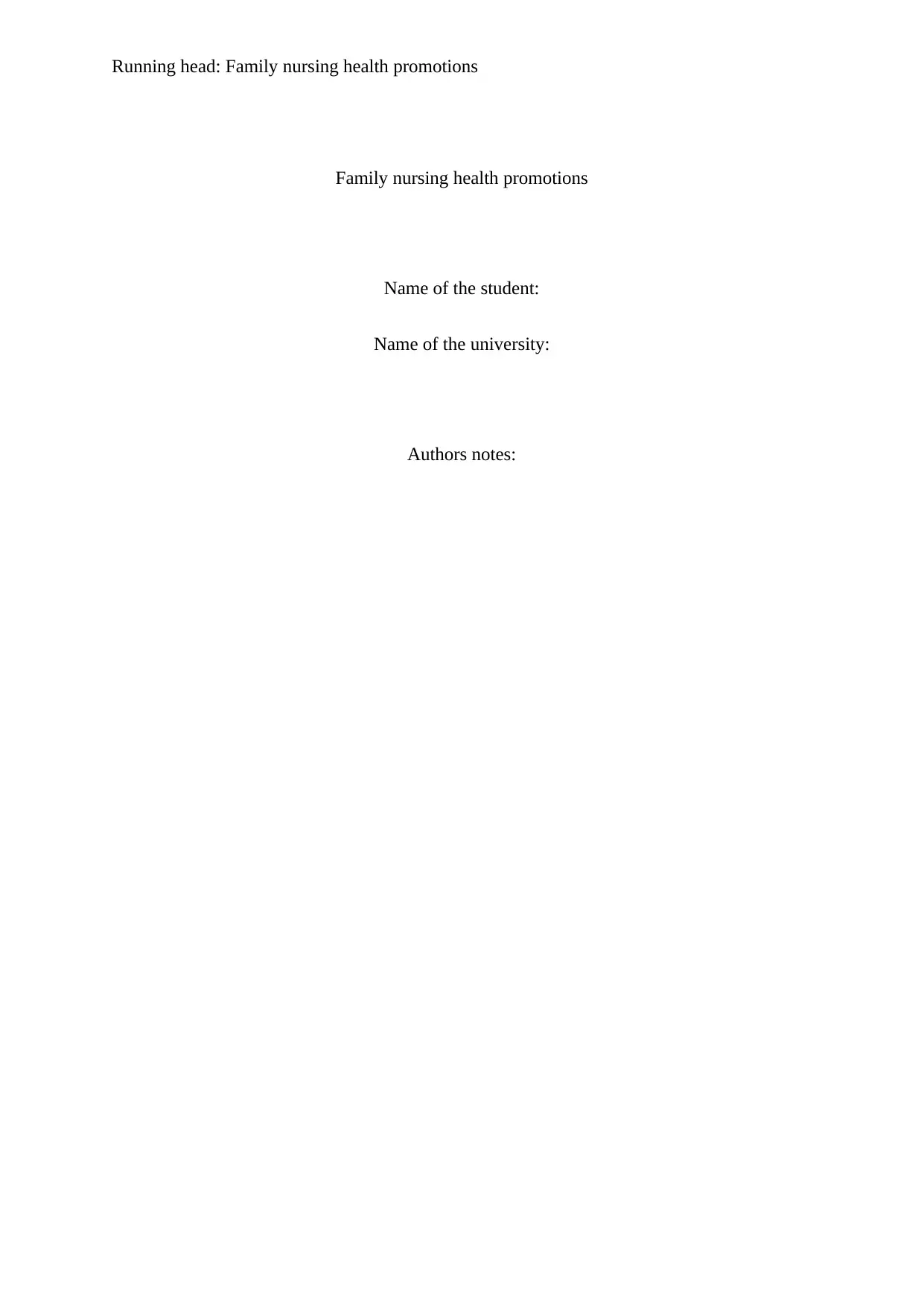
Running head: Family nursing health promotions
Family nursing health promotions
Name of the student:
Name of the university:
Authors notes:
Family nursing health promotions
Name of the student:
Name of the university:
Authors notes:
Paraphrase This Document
Need a fresh take? Get an instant paraphrase of this document with our AI Paraphraser
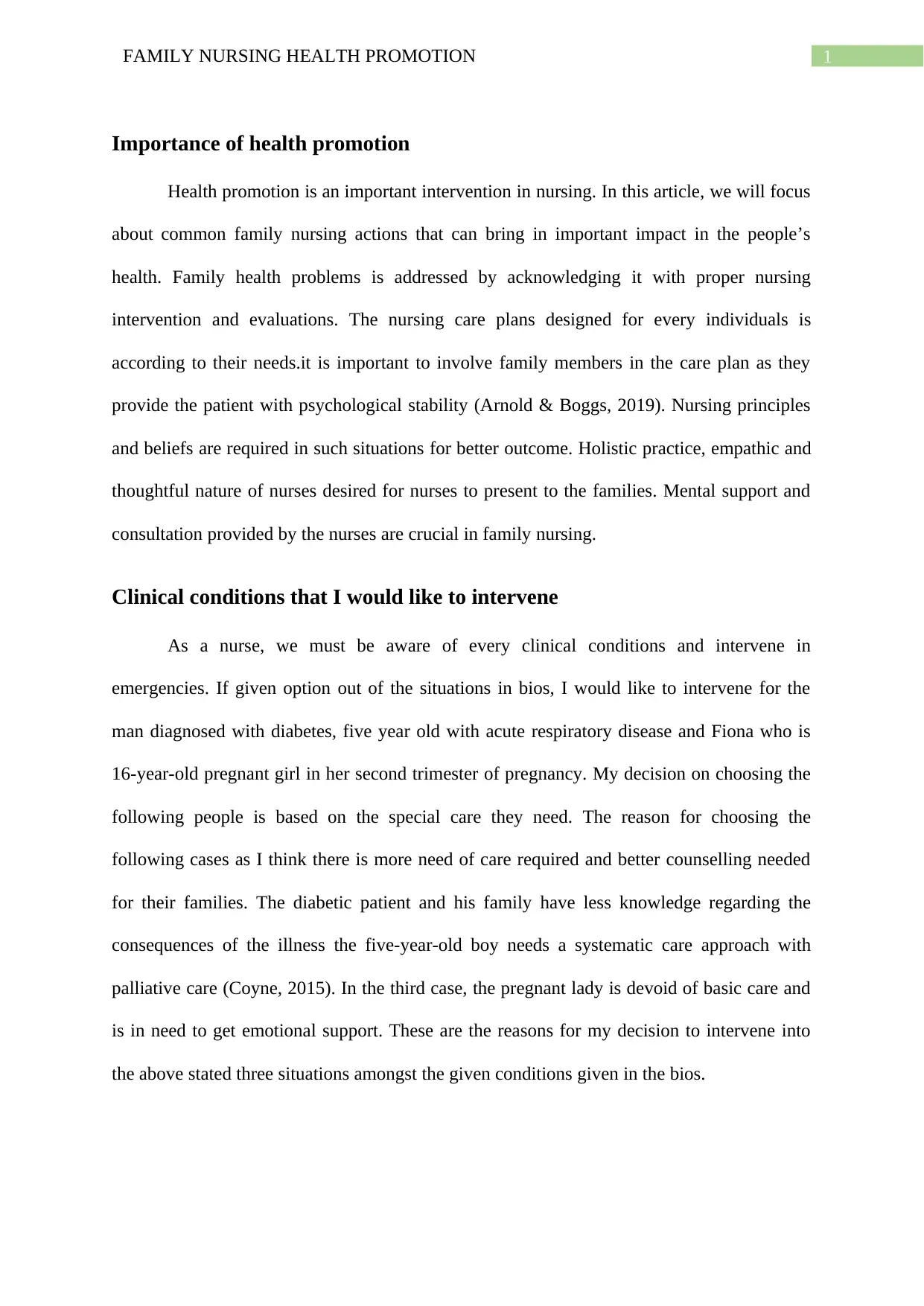
1FAMILY NURSING HEALTH PROMOTION
Importance of health promotion
Health promotion is an important intervention in nursing. In this article, we will focus
about common family nursing actions that can bring in important impact in the people’s
health. Family health problems is addressed by acknowledging it with proper nursing
intervention and evaluations. The nursing care plans designed for every individuals is
according to their needs.it is important to involve family members in the care plan as they
provide the patient with psychological stability (Arnold & Boggs, 2019). Nursing principles
and beliefs are required in such situations for better outcome. Holistic practice, empathic and
thoughtful nature of nurses desired for nurses to present to the families. Mental support and
consultation provided by the nurses are crucial in family nursing.
Clinical conditions that I would like to intervene
As a nurse, we must be aware of every clinical conditions and intervene in
emergencies. If given option out of the situations in bios, I would like to intervene for the
man diagnosed with diabetes, five year old with acute respiratory disease and Fiona who is
16-year-old pregnant girl in her second trimester of pregnancy. My decision on choosing the
following people is based on the special care they need. The reason for choosing the
following cases as I think there is more need of care required and better counselling needed
for their families. The diabetic patient and his family have less knowledge regarding the
consequences of the illness the five-year-old boy needs a systematic care approach with
palliative care (Coyne, 2015). In the third case, the pregnant lady is devoid of basic care and
is in need to get emotional support. These are the reasons for my decision to intervene into
the above stated three situations amongst the given conditions given in the bios.
Importance of health promotion
Health promotion is an important intervention in nursing. In this article, we will focus
about common family nursing actions that can bring in important impact in the people’s
health. Family health problems is addressed by acknowledging it with proper nursing
intervention and evaluations. The nursing care plans designed for every individuals is
according to their needs.it is important to involve family members in the care plan as they
provide the patient with psychological stability (Arnold & Boggs, 2019). Nursing principles
and beliefs are required in such situations for better outcome. Holistic practice, empathic and
thoughtful nature of nurses desired for nurses to present to the families. Mental support and
consultation provided by the nurses are crucial in family nursing.
Clinical conditions that I would like to intervene
As a nurse, we must be aware of every clinical conditions and intervene in
emergencies. If given option out of the situations in bios, I would like to intervene for the
man diagnosed with diabetes, five year old with acute respiratory disease and Fiona who is
16-year-old pregnant girl in her second trimester of pregnancy. My decision on choosing the
following people is based on the special care they need. The reason for choosing the
following cases as I think there is more need of care required and better counselling needed
for their families. The diabetic patient and his family have less knowledge regarding the
consequences of the illness the five-year-old boy needs a systematic care approach with
palliative care (Coyne, 2015). In the third case, the pregnant lady is devoid of basic care and
is in need to get emotional support. These are the reasons for my decision to intervene into
the above stated three situations amongst the given conditions given in the bios.
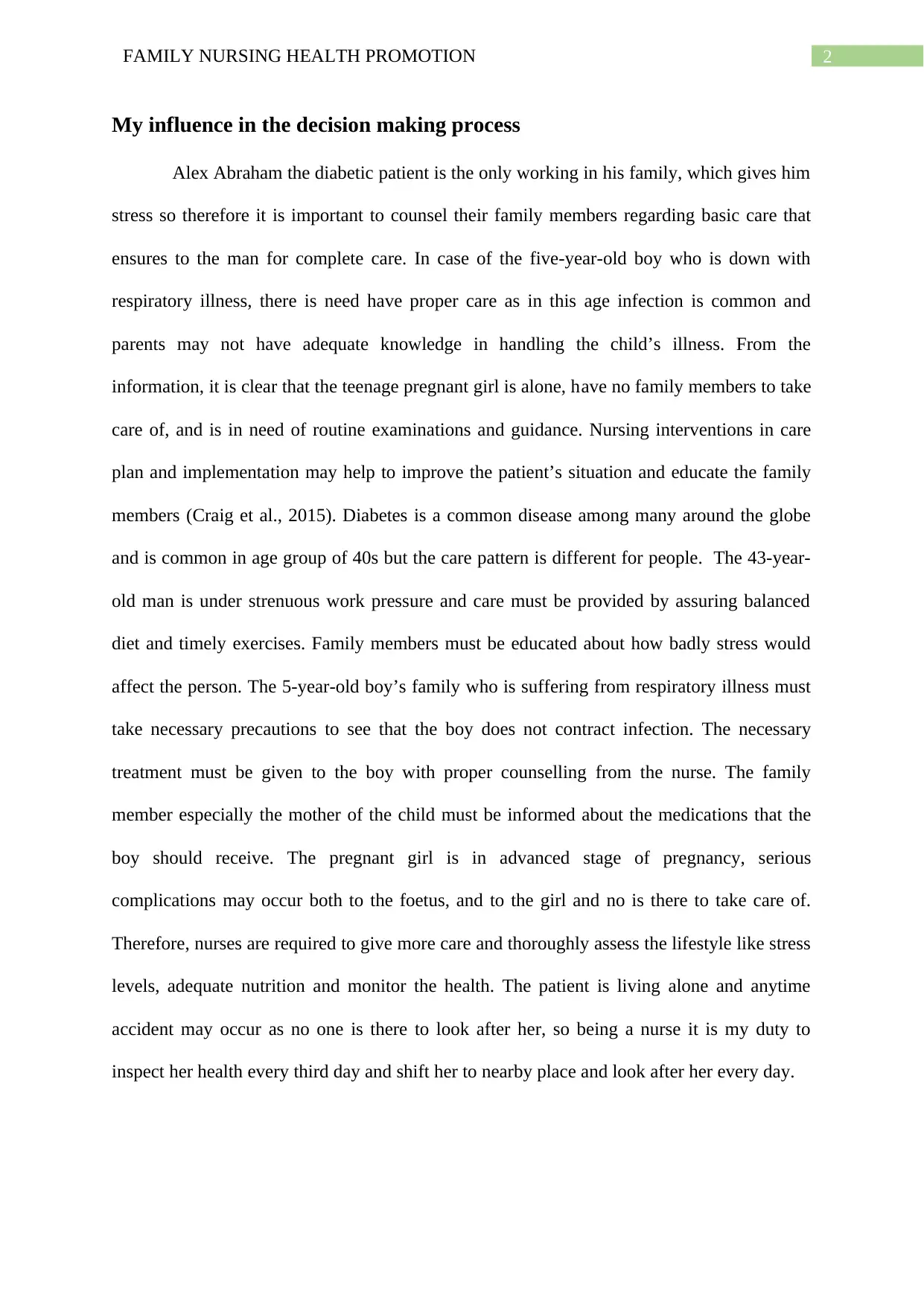
2FAMILY NURSING HEALTH PROMOTION
My influence in the decision making process
Alex Abraham the diabetic patient is the only working in his family, which gives him
stress so therefore it is important to counsel their family members regarding basic care that
ensures to the man for complete care. In case of the five-year-old boy who is down with
respiratory illness, there is need have proper care as in this age infection is common and
parents may not have adequate knowledge in handling the child’s illness. From the
information, it is clear that the teenage pregnant girl is alone, have no family members to take
care of, and is in need of routine examinations and guidance. Nursing interventions in care
plan and implementation may help to improve the patient’s situation and educate the family
members (Craig et al., 2015). Diabetes is a common disease among many around the globe
and is common in age group of 40s but the care pattern is different for people. The 43-year-
old man is under strenuous work pressure and care must be provided by assuring balanced
diet and timely exercises. Family members must be educated about how badly stress would
affect the person. The 5-year-old boy’s family who is suffering from respiratory illness must
take necessary precautions to see that the boy does not contract infection. The necessary
treatment must be given to the boy with proper counselling from the nurse. The family
member especially the mother of the child must be informed about the medications that the
boy should receive. The pregnant girl is in advanced stage of pregnancy, serious
complications may occur both to the foetus, and to the girl and no is there to take care of.
Therefore, nurses are required to give more care and thoroughly assess the lifestyle like stress
levels, adequate nutrition and monitor the health. The patient is living alone and anytime
accident may occur as no one is there to look after her, so being a nurse it is my duty to
inspect her health every third day and shift her to nearby place and look after her every day.
My influence in the decision making process
Alex Abraham the diabetic patient is the only working in his family, which gives him
stress so therefore it is important to counsel their family members regarding basic care that
ensures to the man for complete care. In case of the five-year-old boy who is down with
respiratory illness, there is need have proper care as in this age infection is common and
parents may not have adequate knowledge in handling the child’s illness. From the
information, it is clear that the teenage pregnant girl is alone, have no family members to take
care of, and is in need of routine examinations and guidance. Nursing interventions in care
plan and implementation may help to improve the patient’s situation and educate the family
members (Craig et al., 2015). Diabetes is a common disease among many around the globe
and is common in age group of 40s but the care pattern is different for people. The 43-year-
old man is under strenuous work pressure and care must be provided by assuring balanced
diet and timely exercises. Family members must be educated about how badly stress would
affect the person. The 5-year-old boy’s family who is suffering from respiratory illness must
take necessary precautions to see that the boy does not contract infection. The necessary
treatment must be given to the boy with proper counselling from the nurse. The family
member especially the mother of the child must be informed about the medications that the
boy should receive. The pregnant girl is in advanced stage of pregnancy, serious
complications may occur both to the foetus, and to the girl and no is there to take care of.
Therefore, nurses are required to give more care and thoroughly assess the lifestyle like stress
levels, adequate nutrition and monitor the health. The patient is living alone and anytime
accident may occur as no one is there to look after her, so being a nurse it is my duty to
inspect her health every third day and shift her to nearby place and look after her every day.
⊘ This is a preview!⊘
Do you want full access?
Subscribe today to unlock all pages.

Trusted by 1+ million students worldwide
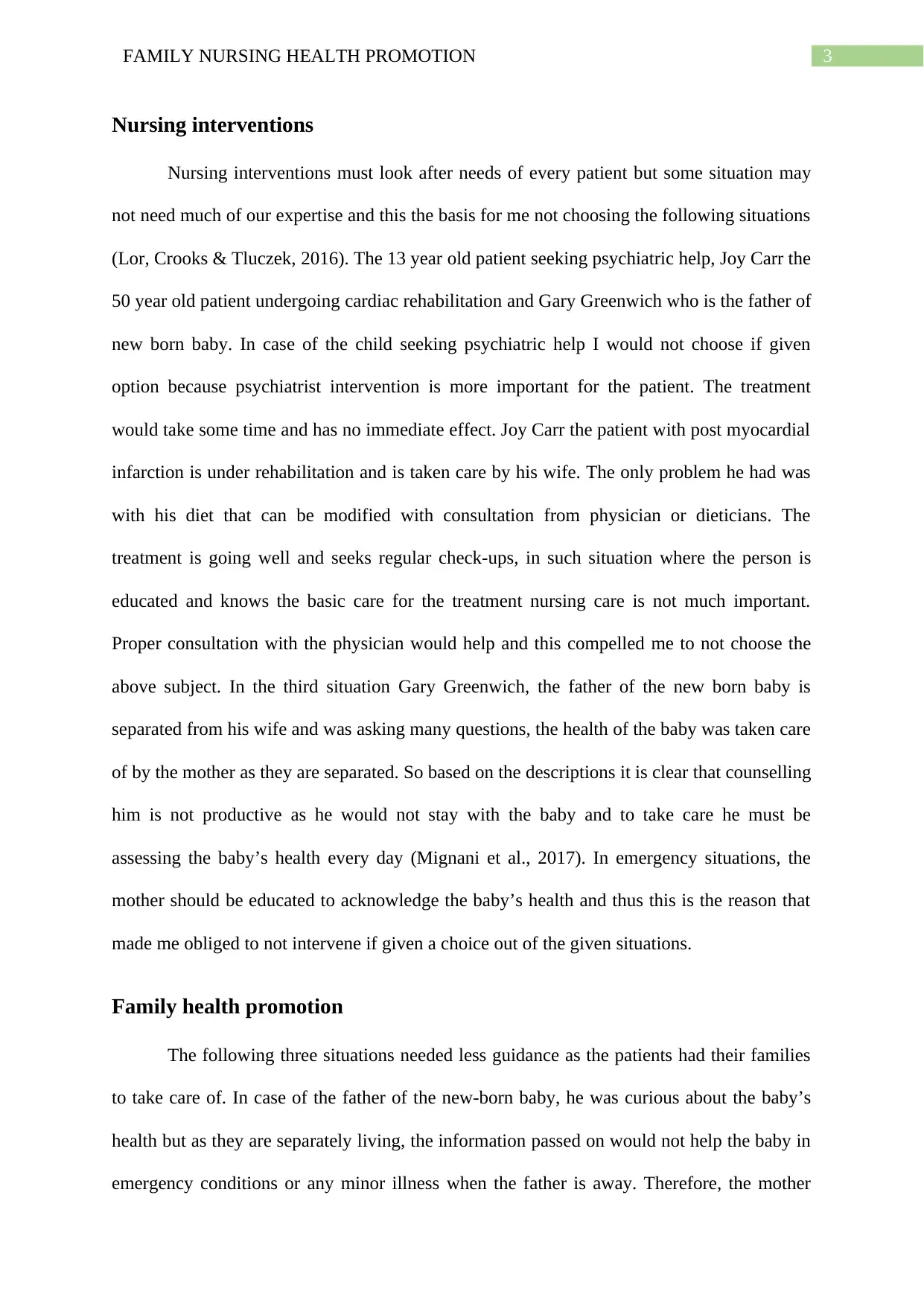
3FAMILY NURSING HEALTH PROMOTION
Nursing interventions
Nursing interventions must look after needs of every patient but some situation may
not need much of our expertise and this the basis for me not choosing the following situations
(Lor, Crooks & Tluczek, 2016). The 13 year old patient seeking psychiatric help, Joy Carr the
50 year old patient undergoing cardiac rehabilitation and Gary Greenwich who is the father of
new born baby. In case of the child seeking psychiatric help I would not choose if given
option because psychiatrist intervention is more important for the patient. The treatment
would take some time and has no immediate effect. Joy Carr the patient with post myocardial
infarction is under rehabilitation and is taken care by his wife. The only problem he had was
with his diet that can be modified with consultation from physician or dieticians. The
treatment is going well and seeks regular check-ups, in such situation where the person is
educated and knows the basic care for the treatment nursing care is not much important.
Proper consultation with the physician would help and this compelled me to not choose the
above subject. In the third situation Gary Greenwich, the father of the new born baby is
separated from his wife and was asking many questions, the health of the baby was taken care
of by the mother as they are separated. So based on the descriptions it is clear that counselling
him is not productive as he would not stay with the baby and to take care he must be
assessing the baby’s health every day (Mignani et al., 2017). In emergency situations, the
mother should be educated to acknowledge the baby’s health and thus this is the reason that
made me obliged to not intervene if given a choice out of the given situations.
Family health promotion
The following three situations needed less guidance as the patients had their families
to take care of. In case of the father of the new-born baby, he was curious about the baby’s
health but as they are separately living, the information passed on would not help the baby in
emergency conditions or any minor illness when the father is away. Therefore, the mother
Nursing interventions
Nursing interventions must look after needs of every patient but some situation may
not need much of our expertise and this the basis for me not choosing the following situations
(Lor, Crooks & Tluczek, 2016). The 13 year old patient seeking psychiatric help, Joy Carr the
50 year old patient undergoing cardiac rehabilitation and Gary Greenwich who is the father of
new born baby. In case of the child seeking psychiatric help I would not choose if given
option because psychiatrist intervention is more important for the patient. The treatment
would take some time and has no immediate effect. Joy Carr the patient with post myocardial
infarction is under rehabilitation and is taken care by his wife. The only problem he had was
with his diet that can be modified with consultation from physician or dieticians. The
treatment is going well and seeks regular check-ups, in such situation where the person is
educated and knows the basic care for the treatment nursing care is not much important.
Proper consultation with the physician would help and this compelled me to not choose the
above subject. In the third situation Gary Greenwich, the father of the new born baby is
separated from his wife and was asking many questions, the health of the baby was taken care
of by the mother as they are separated. So based on the descriptions it is clear that counselling
him is not productive as he would not stay with the baby and to take care he must be
assessing the baby’s health every day (Mignani et al., 2017). In emergency situations, the
mother should be educated to acknowledge the baby’s health and thus this is the reason that
made me obliged to not intervene if given a choice out of the given situations.
Family health promotion
The following three situations needed less guidance as the patients had their families
to take care of. In case of the father of the new-born baby, he was curious about the baby’s
health but as they are separately living, the information passed on would not help the baby in
emergency conditions or any minor illness when the father is away. Therefore, the mother
Paraphrase This Document
Need a fresh take? Get an instant paraphrase of this document with our AI Paraphraser
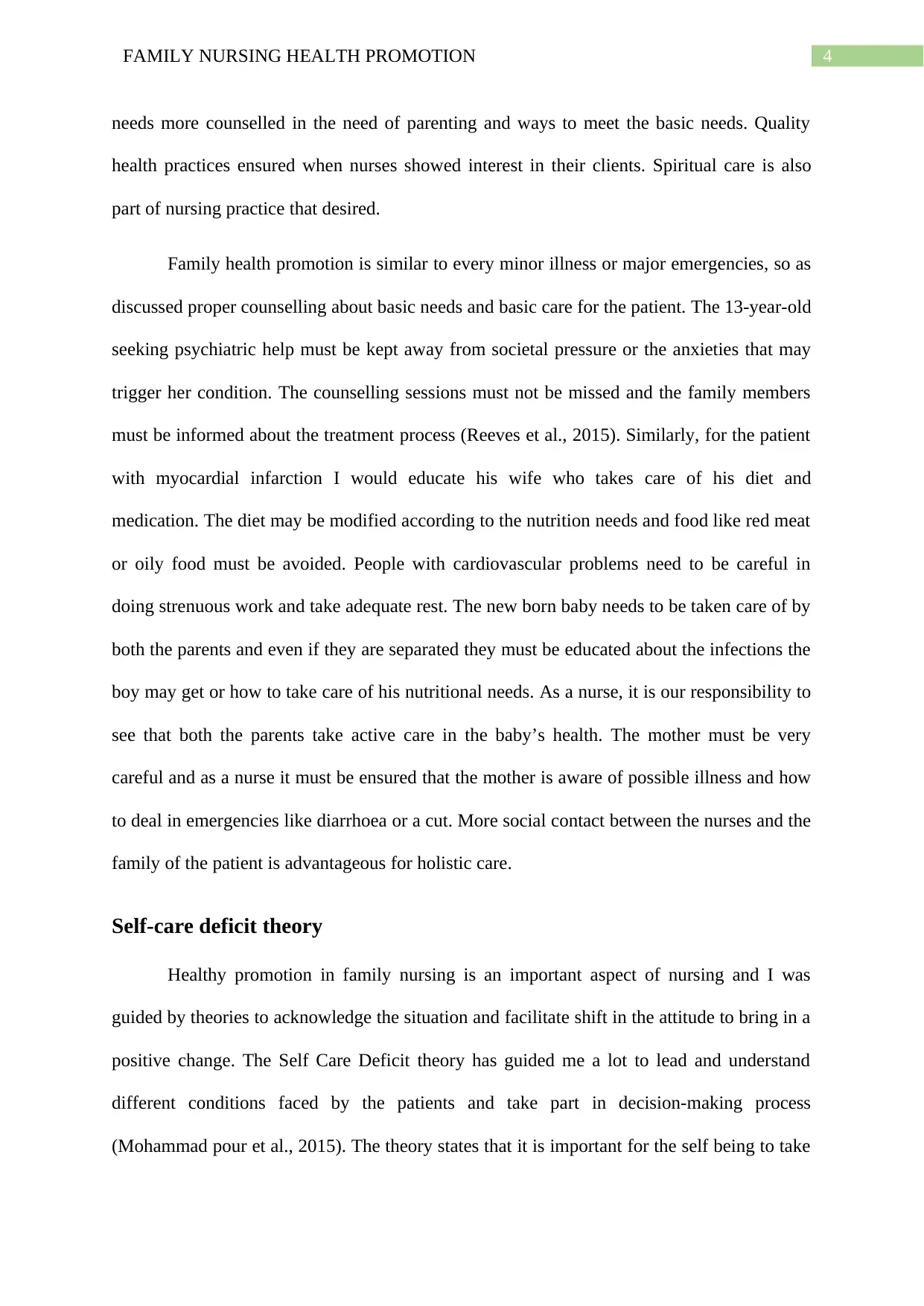
4FAMILY NURSING HEALTH PROMOTION
needs more counselled in the need of parenting and ways to meet the basic needs. Quality
health practices ensured when nurses showed interest in their clients. Spiritual care is also
part of nursing practice that desired.
Family health promotion is similar to every minor illness or major emergencies, so as
discussed proper counselling about basic needs and basic care for the patient. The 13-year-old
seeking psychiatric help must be kept away from societal pressure or the anxieties that may
trigger her condition. The counselling sessions must not be missed and the family members
must be informed about the treatment process (Reeves et al., 2015). Similarly, for the patient
with myocardial infarction I would educate his wife who takes care of his diet and
medication. The diet may be modified according to the nutrition needs and food like red meat
or oily food must be avoided. People with cardiovascular problems need to be careful in
doing strenuous work and take adequate rest. The new born baby needs to be taken care of by
both the parents and even if they are separated they must be educated about the infections the
boy may get or how to take care of his nutritional needs. As a nurse, it is our responsibility to
see that both the parents take active care in the baby’s health. The mother must be very
careful and as a nurse it must be ensured that the mother is aware of possible illness and how
to deal in emergencies like diarrhoea or a cut. More social contact between the nurses and the
family of the patient is advantageous for holistic care.
Self-care deficit theory
Healthy promotion in family nursing is an important aspect of nursing and I was
guided by theories to acknowledge the situation and facilitate shift in the attitude to bring in a
positive change. The Self Care Deficit theory has guided me a lot to lead and understand
different conditions faced by the patients and take part in decision-making process
(Mohammad pour et al., 2015). The theory states that it is important for the self being to take
needs more counselled in the need of parenting and ways to meet the basic needs. Quality
health practices ensured when nurses showed interest in their clients. Spiritual care is also
part of nursing practice that desired.
Family health promotion is similar to every minor illness or major emergencies, so as
discussed proper counselling about basic needs and basic care for the patient. The 13-year-old
seeking psychiatric help must be kept away from societal pressure or the anxieties that may
trigger her condition. The counselling sessions must not be missed and the family members
must be informed about the treatment process (Reeves et al., 2015). Similarly, for the patient
with myocardial infarction I would educate his wife who takes care of his diet and
medication. The diet may be modified according to the nutrition needs and food like red meat
or oily food must be avoided. People with cardiovascular problems need to be careful in
doing strenuous work and take adequate rest. The new born baby needs to be taken care of by
both the parents and even if they are separated they must be educated about the infections the
boy may get or how to take care of his nutritional needs. As a nurse, it is our responsibility to
see that both the parents take active care in the baby’s health. The mother must be very
careful and as a nurse it must be ensured that the mother is aware of possible illness and how
to deal in emergencies like diarrhoea or a cut. More social contact between the nurses and the
family of the patient is advantageous for holistic care.
Self-care deficit theory
Healthy promotion in family nursing is an important aspect of nursing and I was
guided by theories to acknowledge the situation and facilitate shift in the attitude to bring in a
positive change. The Self Care Deficit theory has guided me a lot to lead and understand
different conditions faced by the patients and take part in decision-making process
(Mohammad pour et al., 2015). The theory states that it is important for the self being to take
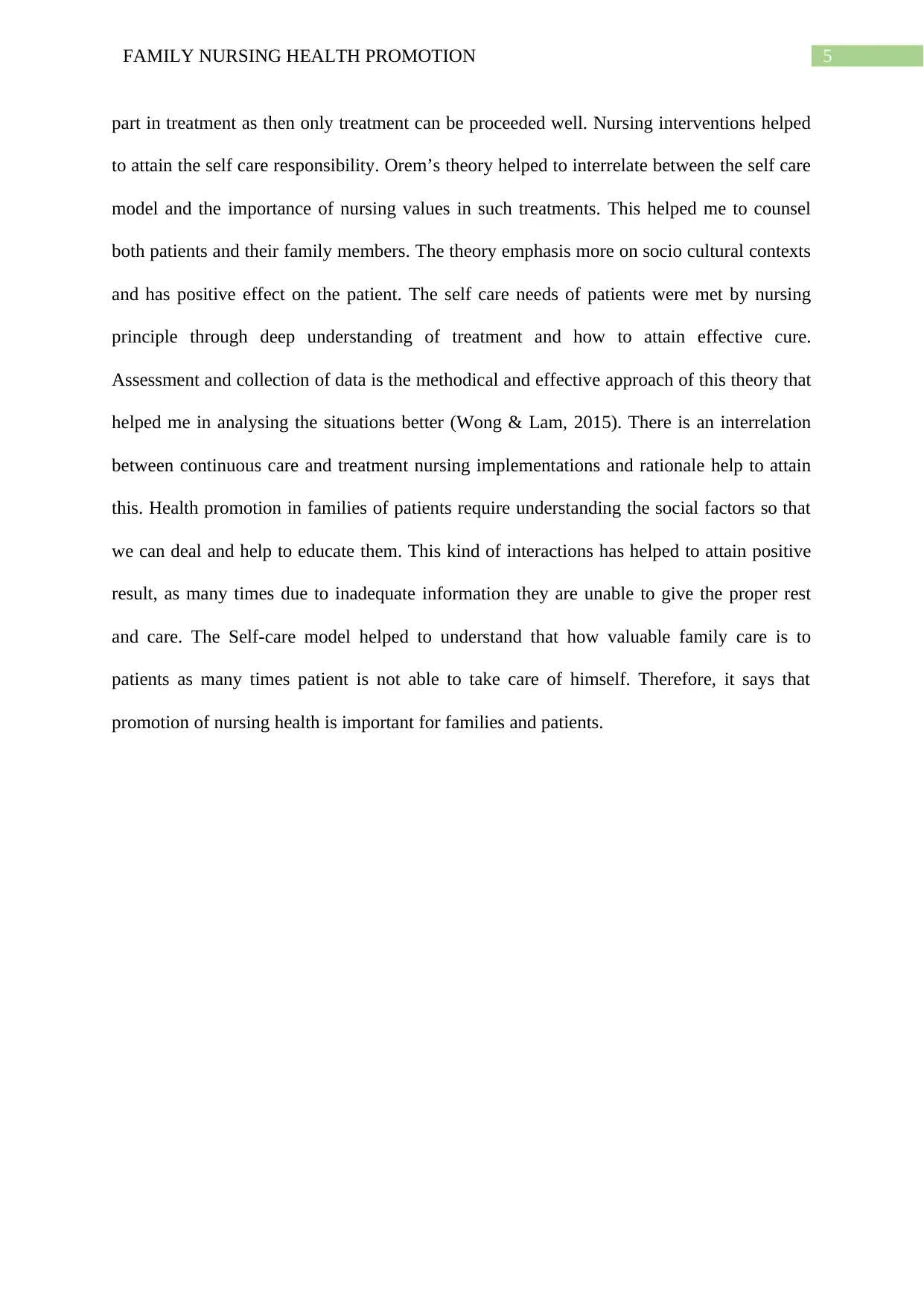
5FAMILY NURSING HEALTH PROMOTION
part in treatment as then only treatment can be proceeded well. Nursing interventions helped
to attain the self care responsibility. Orem’s theory helped to interrelate between the self care
model and the importance of nursing values in such treatments. This helped me to counsel
both patients and their family members. The theory emphasis more on socio cultural contexts
and has positive effect on the patient. The self care needs of patients were met by nursing
principle through deep understanding of treatment and how to attain effective cure.
Assessment and collection of data is the methodical and effective approach of this theory that
helped me in analysing the situations better (Wong & Lam, 2015). There is an interrelation
between continuous care and treatment nursing implementations and rationale help to attain
this. Health promotion in families of patients require understanding the social factors so that
we can deal and help to educate them. This kind of interactions has helped to attain positive
result, as many times due to inadequate information they are unable to give the proper rest
and care. The Self-care model helped to understand that how valuable family care is to
patients as many times patient is not able to take care of himself. Therefore, it says that
promotion of nursing health is important for families and patients.
part in treatment as then only treatment can be proceeded well. Nursing interventions helped
to attain the self care responsibility. Orem’s theory helped to interrelate between the self care
model and the importance of nursing values in such treatments. This helped me to counsel
both patients and their family members. The theory emphasis more on socio cultural contexts
and has positive effect on the patient. The self care needs of patients were met by nursing
principle through deep understanding of treatment and how to attain effective cure.
Assessment and collection of data is the methodical and effective approach of this theory that
helped me in analysing the situations better (Wong & Lam, 2015). There is an interrelation
between continuous care and treatment nursing implementations and rationale help to attain
this. Health promotion in families of patients require understanding the social factors so that
we can deal and help to educate them. This kind of interactions has helped to attain positive
result, as many times due to inadequate information they are unable to give the proper rest
and care. The Self-care model helped to understand that how valuable family care is to
patients as many times patient is not able to take care of himself. Therefore, it says that
promotion of nursing health is important for families and patients.
⊘ This is a preview!⊘
Do you want full access?
Subscribe today to unlock all pages.

Trusted by 1+ million students worldwide
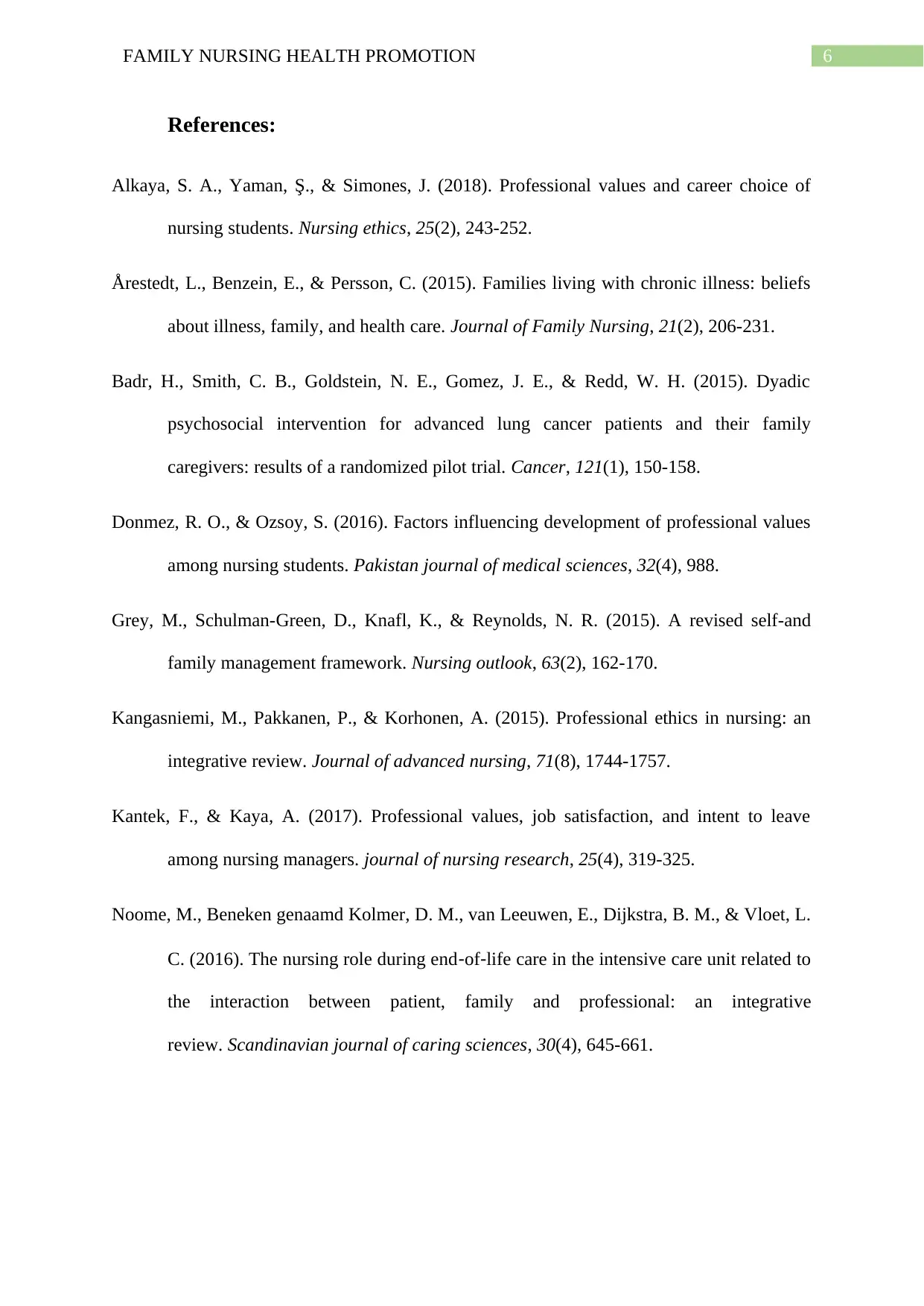
6FAMILY NURSING HEALTH PROMOTION
References:
Alkaya, S. A., Yaman, Ş., & Simones, J. (2018). Professional values and career choice of
nursing students. Nursing ethics, 25(2), 243-252.
Årestedt, L., Benzein, E., & Persson, C. (2015). Families living with chronic illness: beliefs
about illness, family, and health care. Journal of Family Nursing, 21(2), 206-231.
Badr, H., Smith, C. B., Goldstein, N. E., Gomez, J. E., & Redd, W. H. (2015). Dyadic
psychosocial intervention for advanced lung cancer patients and their family
caregivers: results of a randomized pilot trial. Cancer, 121(1), 150-158.
Donmez, R. O., & Ozsoy, S. (2016). Factors influencing development of professional values
among nursing students. Pakistan journal of medical sciences, 32(4), 988.
Grey, M., Schulman-Green, D., Knafl, K., & Reynolds, N. R. (2015). A revised self-and
family management framework. Nursing outlook, 63(2), 162-170.
Kangasniemi, M., Pakkanen, P., & Korhonen, A. (2015). Professional ethics in nursing: an
integrative review. Journal of advanced nursing, 71(8), 1744-1757.
Kantek, F., & Kaya, A. (2017). Professional values, job satisfaction, and intent to leave
among nursing managers. journal of nursing research, 25(4), 319-325.
Noome, M., Beneken genaamd Kolmer, D. M., van Leeuwen, E., Dijkstra, B. M., & Vloet, L.
C. (2016). The nursing role during end‐of‐life care in the intensive care unit related to
the interaction between patient, family and professional: an integrative
review. Scandinavian journal of caring sciences, 30(4), 645-661.
References:
Alkaya, S. A., Yaman, Ş., & Simones, J. (2018). Professional values and career choice of
nursing students. Nursing ethics, 25(2), 243-252.
Årestedt, L., Benzein, E., & Persson, C. (2015). Families living with chronic illness: beliefs
about illness, family, and health care. Journal of Family Nursing, 21(2), 206-231.
Badr, H., Smith, C. B., Goldstein, N. E., Gomez, J. E., & Redd, W. H. (2015). Dyadic
psychosocial intervention for advanced lung cancer patients and their family
caregivers: results of a randomized pilot trial. Cancer, 121(1), 150-158.
Donmez, R. O., & Ozsoy, S. (2016). Factors influencing development of professional values
among nursing students. Pakistan journal of medical sciences, 32(4), 988.
Grey, M., Schulman-Green, D., Knafl, K., & Reynolds, N. R. (2015). A revised self-and
family management framework. Nursing outlook, 63(2), 162-170.
Kangasniemi, M., Pakkanen, P., & Korhonen, A. (2015). Professional ethics in nursing: an
integrative review. Journal of advanced nursing, 71(8), 1744-1757.
Kantek, F., & Kaya, A. (2017). Professional values, job satisfaction, and intent to leave
among nursing managers. journal of nursing research, 25(4), 319-325.
Noome, M., Beneken genaamd Kolmer, D. M., van Leeuwen, E., Dijkstra, B. M., & Vloet, L.
C. (2016). The nursing role during end‐of‐life care in the intensive care unit related to
the interaction between patient, family and professional: an integrative
review. Scandinavian journal of caring sciences, 30(4), 645-661.
Paraphrase This Document
Need a fresh take? Get an instant paraphrase of this document with our AI Paraphraser
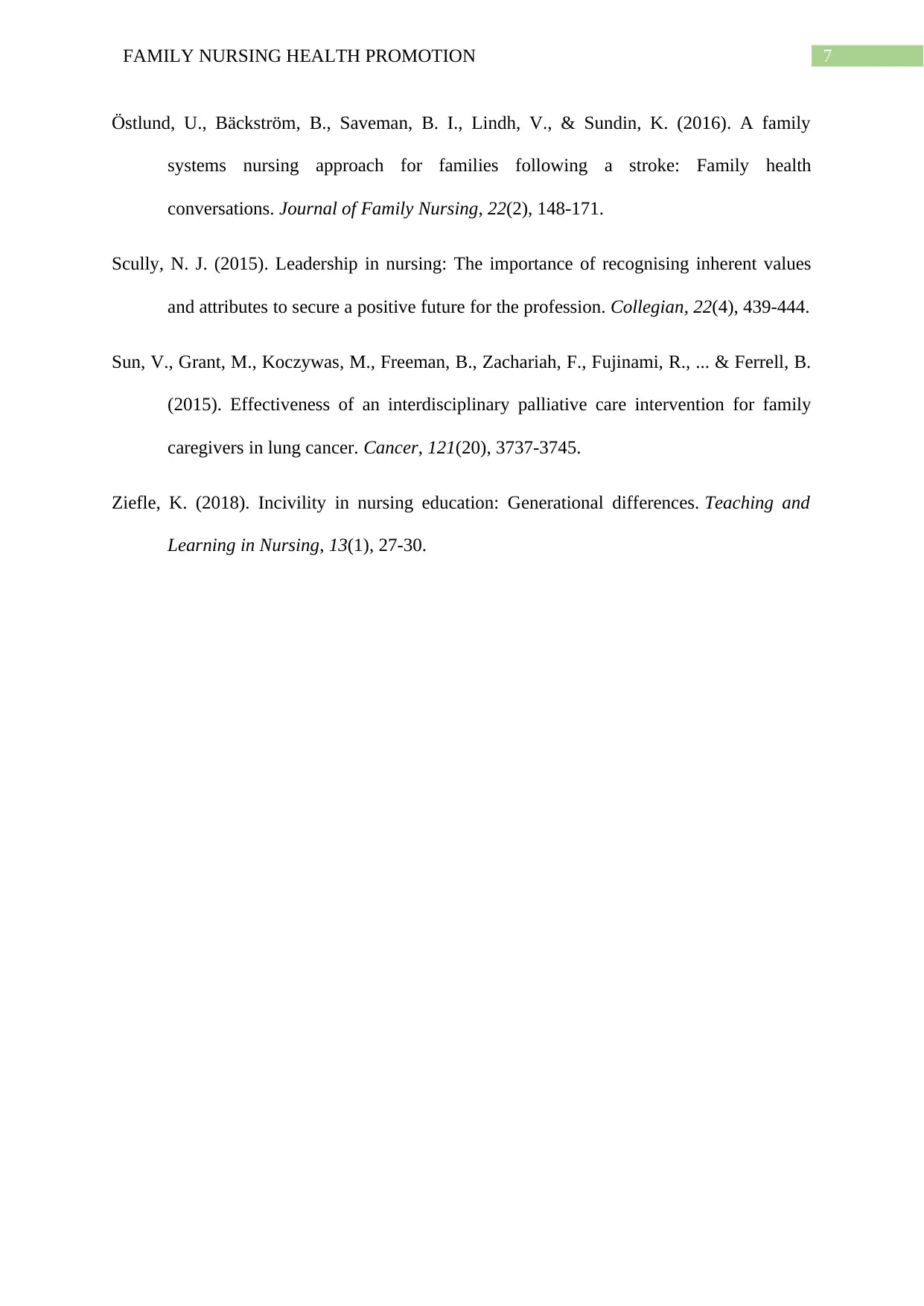
7FAMILY NURSING HEALTH PROMOTION
Östlund, U., Bäckström, B., Saveman, B. I., Lindh, V., & Sundin, K. (2016). A family
systems nursing approach for families following a stroke: Family health
conversations. Journal of Family Nursing, 22(2), 148-171.
Scully, N. J. (2015). Leadership in nursing: The importance of recognising inherent values
and attributes to secure a positive future for the profession. Collegian, 22(4), 439-444.
Sun, V., Grant, M., Koczywas, M., Freeman, B., Zachariah, F., Fujinami, R., ... & Ferrell, B.
(2015). Effectiveness of an interdisciplinary palliative care intervention for family
caregivers in lung cancer. Cancer, 121(20), 3737-3745.
Ziefle, K. (2018). Incivility in nursing education: Generational differences. Teaching and
Learning in Nursing, 13(1), 27-30.
Östlund, U., Bäckström, B., Saveman, B. I., Lindh, V., & Sundin, K. (2016). A family
systems nursing approach for families following a stroke: Family health
conversations. Journal of Family Nursing, 22(2), 148-171.
Scully, N. J. (2015). Leadership in nursing: The importance of recognising inherent values
and attributes to secure a positive future for the profession. Collegian, 22(4), 439-444.
Sun, V., Grant, M., Koczywas, M., Freeman, B., Zachariah, F., Fujinami, R., ... & Ferrell, B.
(2015). Effectiveness of an interdisciplinary palliative care intervention for family
caregivers in lung cancer. Cancer, 121(20), 3737-3745.
Ziefle, K. (2018). Incivility in nursing education: Generational differences. Teaching and
Learning in Nursing, 13(1), 27-30.
1 out of 8
Related Documents
Your All-in-One AI-Powered Toolkit for Academic Success.
+13062052269
info@desklib.com
Available 24*7 on WhatsApp / Email
![[object Object]](/_next/static/media/star-bottom.7253800d.svg)
Unlock your academic potential
Copyright © 2020–2026 A2Z Services. All Rights Reserved. Developed and managed by ZUCOL.





